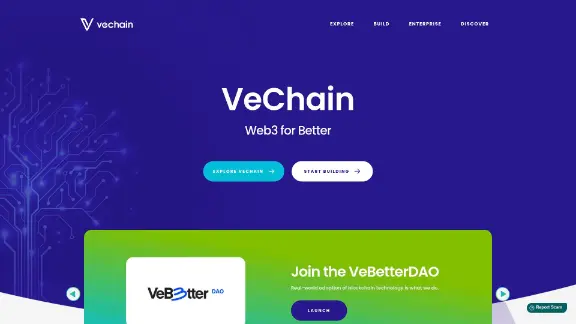VeChain (VET)
VeChain is a blockchain platform dedicated to enhancing supply chain solutions for businesses. It operates on VeChainThor, a public blockchain designed to facilitate the widespread adoption of blockchain technology among enterprises of various sizes. This platform aims to improve supply chain management and streamline business processes through distributed ledger technology.
Overview of VeChain
VeChain was established by Sunny Lu and launched on the Ethereum blockchain in 2015 as part of Bitse, a blockchain-as-a-service company based in China. The platform incorporates unique governance and economic models to enable efficient and transparent operations with manageable and predictable costs. By building upon Ethereum's foundational elements, VeChain provides tailored solutions for both enterprises and developers.
VeChain's ecosystem supports decentralized operations through a robust governance framework and economic model, achieving these goals through meta-transactions, proof-of-authority consensus, and a dual-token system.

| Ticker | VET |
| Category | Internet of Things (IOT) |
| Website | https://www.vechain.org |
| @vechainofficial | |
| Telegram | vechainandfriends |
| https://www.reddit.com/r/Vechain | |
| Contract Addresses | |
|---|---|
| vechain | |
VeChain tokenomics
VeChain employs a two-token system consisting of VeChain Token (VET) and VeThor Token (VTHO) to decouple blockchain usage costs from market speculation. The relationship between VTHO supply and demand allows for more predictable costs, further stabilized by the VeChain Foundation's governance.
VET serves as a medium of value transfer, facilitating value circulation within the VeChainThor ecosystem. VTHO, on the other hand, covers transaction costs and is generated from addresses holding VET at a set rate. A portion of VTHO used in transactions is burned, while the remainder is awarded to the Authority Masternode Operator.
Governance in VeChain
VeChain's governance model strikes a balance between decentralization and centralization to address the evolving needs of blockchain technology and its ecosystem. The platform is governed by a Steering Committee, elected by stakeholders with VET Voting Authority, to provide visibility, inclusiveness, transparency, flexibility, and efficiency.
Stakeholder categories and voting authority
There are three main stakeholder categories with voting authority: Authority Masternodes, Economic X Nodes, and Economic Nodes. Authority Masternodes maintain the network and are the only nodes authorized to package blocks. Economic X Nodes and Economic Nodes were introduced early in the ecosystem's development to reward long-term supporters. Voting authority is distributed among these categories, with distinct VET holding requirements and voting power.
Proof-of-Authority (PoA) in VeChain
VeChainThor relies on Authority Masternode Operators and uses a Proof-of-Authority consensus mechanism designed to address enterprise concerns such as upgrade inefficiencies and energy consumption. This mechanism requires minimal computational power and maintains network security through built-in smart contracts.
Individuals or entities wishing to become Authority Masternodes must disclose their identities and undergo a know-your-customer procedure to ensure network security. Blocks are generated by Authority Masternodes every 10 seconds.
Introduction to PoA2.0
On November 17, 2022, VeChain upgraded its blockchain to Proof of Authority 2.0 (PoA2.0), enhancing robustness, scalability, and security. This upgrade introduced new security mechanisms and finality features.
PoA2.0 features
PoA2.0 includes the Finality with One Bit (FOB) feature and the Verifiable Random Function (VRF) to generate random numbers. Additionally, a committee function offers an extra verification layer, enhancing security and minimizing interference.
VeChain ToolChain
VeChain ToolChain is a blockchain-as-a-service platform that simplifies blockchain integration for small and medium-sized enterprises. Launched on April 18, 2019, it offers various interfaces and applications, such as product lifecycle management solutions, available in three versions: Standard, Developer, and Channel Partner.
ToolChain versions
Standard Version
The Standard Version offers pre-configured application modules and tools, enabling SMEs to implement lifecycle management solutions without needing development capabilities.
Developer Version
The Developer Version provides APIs, SDKs, and documentation to enterprises with technical expertise, allowing them to create applications tailored to their needs.
Channel Partner Version
The Channel Partner Version supports customization and independent deployment, enabling partners to develop their blockchain-based ecosystems.
Built-in contracts of VeChainThor
VeChainThor includes six built-in smart contracts designed to enhance transaction processing and extend the capabilities of the Ethereum Virtual Machine. These contracts manage transaction costs, governance parameters, and contract usage efficiently.
History of VeChain
VeChain has established partnerships with major companies like Walmart China and has launched initiatives such as VIMWorld and the APAC Provenance Council. It has developed blockchain-based medical data management solutions and introduced the MyBaby IVF service application. VeChain has also launched a native stablecoin, VeUSD, and joined the Blockchain Infrastructure Alliance.
Governance bodies in VeChain
Steering committee
The Steering Committee oversees VeChain's strategic direction and includes members like Renato Grottola, Antonio Senatore, Sunny Lu, Jay Zhang, and Peter Zhou.
Advisory board
The Advisory Board provides guidance and includes members such as Jen Breyer, CY Cheung, James Gong, Masanari Koike, Ning Nan, Bo Shen, and Roland Sun.
